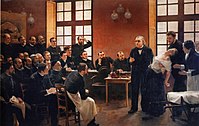
How task demands shape brain responses to visual food cues
Sign Up to like & getrecommendations! Published in 2017 at "Human Brain Mapping"
DOI: 10.1002/hbm.23560
Abstract: Several previous imaging studies have aimed at identifying the neural basis of visual food cue processing in humans. However, there is little consistency of the functional magnetic resonance imaging (fMRI) results across studies. Here, we… read more here.
Keywords: brain responses; cortex; visual food; responses food ... See more keywords

Difference in neural reactivity to taste stimuli and visual food stimuli in neural circuits of ingestive behavior
Sign Up to like & getrecommendations! Published in 2019 at "Brain Imaging and Behavior"
DOI: 10.1007/s11682-019-00048-0
Abstract: Brain responses to sight and taste of foods have been examined to provide insights into neural substrates of ingestive behavior. Since the brain response to food images and taste stimuli are overlapped in neural circuits… read more here.
Keywords: brain responses; brain response; taste stimuli; brain ... See more keywords

Work first then play: Prior task difficulty increases motivation-related brain responses in a risk game
Sign Up to like & getrecommendations! Published in 2017 at "Biological Psychology"
DOI: 10.1016/j.biopsycho.2017.04.010
Abstract: Task motivation depends on what we did before. A recent theory differentiates between tasks that we want to do and tasks that we have to do. After a have-to task, motivation shifts towards a want-to… read more here.
Keywords: risk game; brain responses; task; motivation ... See more keywords

Brain responses to morphologically complex verbs: An electrophysiological study of Swedish regular and irregular past tense forms
Sign Up to like & getrecommendations! Published in 2019 at "Journal of Neurolinguistics"
DOI: 10.1016/j.jneuroling.2019.01.006
Abstract: Abstract The present electrophysiological study investigated irregular versus regular verb form processing in Swedish during reading. In line with previous results from other languages, overregularized verbs, i.e. incorrect irregular stem + regular past tense suffix combinations (e.g.… read more here.
Keywords: brain responses; tense; responses morphologically; electrophysiological study ... See more keywords

Laminar fMRI: Applications for cognitive neuroscience
Sign Up to like & getrecommendations! Published in 2019 at "NeuroImage"
DOI: 10.1016/j.neuroimage.2017.07.004
Abstract: The cortex is a massively recurrent network, characterized by feedforward and feedback connections between brain areas as well as lateral connections within an area. Feedforward, horizontal and feedback responses largely activate separate layers of a… read more here.
Keywords: laminar fmri; brain responses; brain; cognitive neuroscience ... See more keywords

A M/EEG-fMRI Fusion Primer: Resolving Human Brain Responses in Space and Time
Sign Up to like & getrecommendations! Published in 2020 at "Neuron"
DOI: 10.1016/j.neuron.2020.07.001
Abstract: Any cognitive function is mediated by a network of many cortical sites whose activity is orchestrated through complex temporal dynamics. To understand cognition, we need to identify brain responses simultaneously in space and time. Here… read more here.
Keywords: brain responses; space time; human brain; fmri fusion ... See more keywords

Modulation of electric brain responses evoked by pitch deviants through transcranial direct current stimulation
Sign Up to like & getrecommendations! Published in 2018 at "Neuropsychologia"
DOI: 10.1016/j.neuropsychologia.2017.11.028
Abstract: &NA; Congenital amusia is a neurodevelopmental disorder, characterized by a difficulty detecting pitch deviation that is related to abnormal electrical brain responses. Abnormalities found along the right fronto‐temporal pathway between the inferior frontal gyrus (IFG)… read more here.
Keywords: pitch; brain responses; stimulation; transcranial direct ... See more keywords

Neuroplastic alterations in brain responses to painful visceral stimulations reflects individual neuropathic symptoms in diabetes mellitus patients
Sign Up to like & getrecommendations! Published in 2017 at "Scandinavian Journal of Pain"
DOI: 10.1016/j.sjpain.2012.05.044
Abstract: Abstract Background/aims Abnormal visceral sensory function in diabetes mellitus (DM) leads to neuronal changes in the enteric, peripheral and/or central nervous system (CNS). To explore the role of diabetic autonomic neuropathy (DAN) in patients with… read more here.
Keywords: brain responses; alterations brain; diabetes mellitus; neuroplastic alterations ... See more keywords

Brain responses to watching food commercials compared with nonfood commercials: a meta-analysis on neuroimaging studies
Sign Up to like & getrecommendations! Published in 2020 at "Public Health Nutrition"
DOI: 10.1017/s1368980020003122
Abstract: Abstract Objective: This study aimed to identify and meta-analyse the neuroimaging data and hence synthesise a brain map showing the neural correlates of watching food commercials. Design: Published studies were retrieved and included into the… read more here.
Keywords: food; food commercials; watching food; brain ... See more keywords

Brain Responses to Regular and Octave-Scrambled Melodies: A Case of Predictive-Coding?
Sign Up to like & getrecommendations! Published in 2017 at "Journal of Experimental Psychology: Human Perception and Performance"
DOI: 10.1037/xhp0000340
Abstract: Melody recognition is an online process of evaluating incoming information and comparing this information to an existing internal corpus, thereby reducing prediction error. The predictive-coding model postulates top-down control on sensory processing accompanying reduction in… read more here.
Keywords: octave scrambled; brain responses; melody; predictive coding ... See more keywords

Hypnotic analgesia reduces brain responses to pain seen in others
Sign Up to like & getrecommendations! Published in 2017 at "Scientific Reports"
DOI: 10.1038/s41598-017-10310-4
Abstract: Brain responses to pain experienced by oneself or seen in other people show consistent overlap in the pain processing network, particularly anterior insula, supporting the view that pain empathy partly relies on neural processes engaged… read more here.
Keywords: analgesia reduces; brain responses; hypnotic analgesia; responses pain ... See more keywords